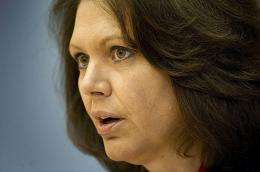German Minister for Food, Agriculture and Consumer Protection Ilse Aigner addresses media during a press conference in Berlin. Germany's under-fire agriculture minister presented on Friday an "action plan" aimed at preventing a repeat of this month's scare over dioxin poisoning in eggs and pork.
Germany's under-fire agriculture minister presented on Friday an "action plan" aimed at preventing a repeat of this month's scare over dioxin poisoning in eggs and pork.
"One thing is clear, this case will have consequences," Ilse Aigner told a news conference in Berlin.
"Even if our current investigations suggest that the dioxin contamination was because of a criminal act, I am using this as a reason to examine the entire animal feed industry, from raw materials to the stall," she said.
"We must raise safety standards."
The scare began last week when it emerged that a German firm may have supplied some 3,000 tonnes of fatty acids only meant for industrial uses to makers of animal feed late last year. The feed was then widely distributed.
Around 100,000 eggs were destroyed while some 4,700 farms were banned from selling their products were closed pending tests. The vast majority of these farms have since been given the all-clear.
On Tuesday authorities said that pork with high levels of dioxin had been discovered at a farm in the state of Lower Saxony, and that potentially tainted meat from the farm could be in shops.
South Korea and China have banned German pork imports, while Japan has ordered importers to report all pork shipments. Slovakia outlawed the sale of German eggs and poultry meat but the ban was lifted on Wednesday.
The German government said previously that none of the up to 150,000 tonnes of suspect animal feed had been exported, but the European Commission said this week that some had in fact made it to Denmark and France.
Around 136,000 eggs meanwhile were exported to the Netherlands, some of which ended up in Britain. German authorities said on Thursday that meat from 35 potentially contaminated pigs was sold in Poland and the Czech Republic.
Aigner has been accused of being slow to act, including by Germany's most-read newspaper Bild, while Renate Kuenast from the opposition Greens, herself a former agriculture minister, called for her to be fired.
Under Aigner's plans, firms cannot produce fats for industrial uses and for animal feed at the same site, makers of animal feed will be subject to tougher regulations and more frequent inspections, and penalties will be harsher.
She also wants to set up an early warning system, to improve safety checks on food and animal feed and to give consumers more transparency by obliging local authorities to make test results and infringements publicly available.
"Our ministry has done everything in its power," Aigner said.
(c) 2011 AFP






















